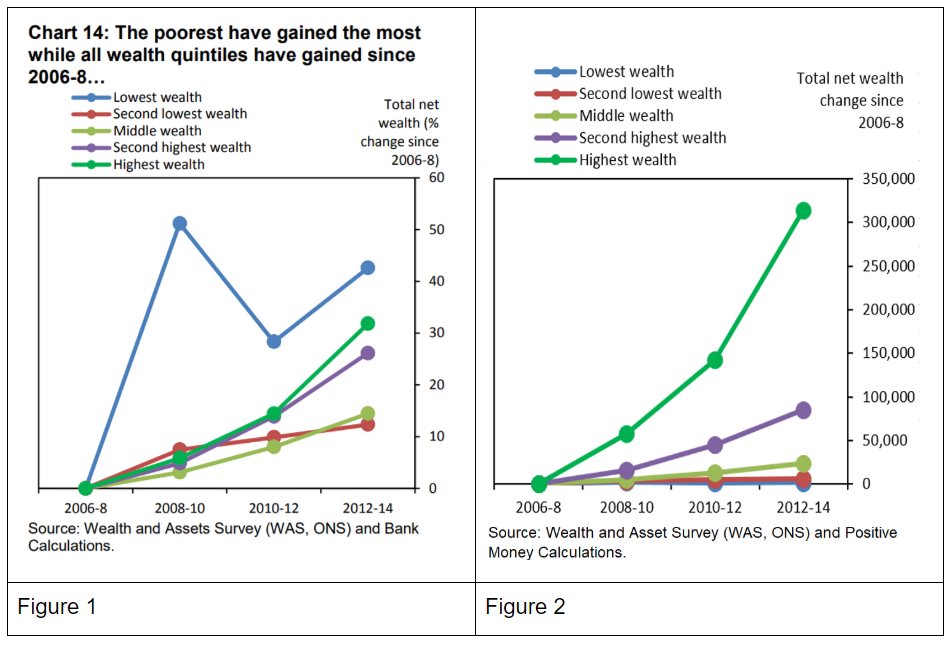Official data shows richest gained over £300,000 each in era of QE

Same dataset used by Mark Carney to claim “poorest have gained the most” from QE shows wealthiest have gained nearly 200 times as much
Net wealth for the poorest 20% remains negative and has fallen since 2010.
Top 1% of households may have gained over one million pounds each from QE.
London, UK, 17 October 2017 — Data obtained by research and campaign group Positive Money suggests that Mark Carney painted a misleading picture of the distributional effect of monetary policy since the crisis, with the wealthiest having gained nearly 200 times that of the poorest following the adoption of quantitative easing (QE).
The Bank of England governor used data from the ONS’ Wealth and Asset Survey to defend the Bank’s monetary stimulus programme, claiming that �“the poorest 20% of households have actually seen the largest proportional increases in their net wealth since 2006”, in a December 2016 speech in Liverpool.
An analysis of the full dataset by Positive Money shows that the net wealth of the poorest fifth of households increased by only £1,659 from 2008 to 2014, while the net wealth of the richest fifth increased over 189 times that, by £314,413, suggesting that it is actually the wealthiest who have benefited the most from the Bank of England’s policies over this period.
The net wealth of the poorest fifth of households remained negative throughout this period, from an average of £-3,896 in 2006-08 to £-2,237 in 2012-14, indicating that their finances remained submerged by debt. The average net wealth of these households actually fell by £892 over the first years of QE, from £-1,902 in 2008-2010 to £-2,793 in 2010-2012. Meanwhile, the average net wealth of the richest fifth increased from £987,209 to £1,301,352 over this whole period.
The increases in net wealth over this period can be attributed in large part to the Bank of England’s QE programme, which has seen £445bn created to purchase assets since 2009, raising the value of assets and thus the net wealth of the asset-rich.
A 2012 analysis from the Bank of England showed that £335bn of QE contributed to a £600bn increase in UK household financial wealth, suggesting that the £445bn of QE may have prompted a total increase of £800bn. With the top 1% of UK households owning 20% of net wealth, this would mean that each of these households gained an average increase in financial net wealth of £590,000. When combined with dramatic increases in non-financial wealth including housing, the top 1% of households are likely to have benefitted by more than one million pounds each.
Edward Smythe, Chief Economist at Positive Money, said “This data shows that Mark Carney has painted a potentially misleading picture on the unequal impact of QE, which has predominantly benefited the rich, at the expense of future generations of asset owners. The governor says that it is the role of elected governments to offset the distributional effects of monetary policy, but they can only do this if they are given a clear and accurate picture.
“Our democracy needs the Bank of England to be fully transparent about the impact of its policies. Rather than allowing monetary policy to continue to fuel inequality, there has to be a discussion about how future stimulus can be designed to boost the economy in a more sustainable manner.”
Notes

Figure 1: Chart used by Mark Carney to argue that the poorest have gained the most since 2006-8 (Source: http://www.bankofengland.co.uk/publications/Documents/speeches/2016/speech946.pdf)
Figure 2: Using the very same data, but in absolute rather than proportional terms, the wealthiest fifth can be shown to have gained 189 times the poorest
Edward Smythe, Chief Economist at Positive Money, is available for briefings and interviews. Please contact David Clarke at david.clarke@positivemoney.org.uk or 02072533235 / 07849598558 for more details.
About Positive Money
Positive Money campaigns for a money and banking system that supports a fair, democratic and sustainable economy. Set up in the aftermath of the financial crisis, we are a not-for-profit company funded by small donors, charitable trusts and foundations.